 MyDogBreeds
MyDogBreeds Flat-Coated Retriever is originated from United Kingdom but Braque Francais (Gascogne Type) is originated from France. Flat-Coated Retriever may grow 8 cm / 3 inches shorter than Braque Francais (Gascogne Type). Both Flat-Coated Retriever and Braque Francais (Gascogne Type) are having almost same weight. Flat-Coated Retriever may live 5 years less than Braque Francais (Gascogne Type). Both Flat-Coated Retriever and Braque Francais (Gascogne Type) has almost same litter size. Flat-Coated Retriever requires Moderate maintenance. But Braque Francais (Gascogne Type) requires Low maintenance
Flat-Coated Retriever is originated from United Kingdom but Braque Francais (Gascogne Type) is originated from France. Flat-Coated Retriever may grow 8 cm / 3 inches shorter than Braque Francais (Gascogne Type). Both Flat-Coated Retriever and Braque Francais (Gascogne Type) are having almost same weight. Flat-Coated Retriever may live 5 years less than Braque Francais (Gascogne Type). Both Flat-Coated Retriever and Braque Francais (Gascogne Type) has almost same litter size. Flat-Coated Retriever requires Moderate maintenance. But Braque Francais (Gascogne Type) requires Low maintenance
 The Flat-Coated Retriever traces its heritage to 19th century England. A popular gamekeepers’ dog, the actual descendants of the breed are not entirely known. Like so many well-established breeds, there are many lines of thought about the breed line. There is an unverified line of ancestry that includes the St. Johns Water Dog – an extinct breed from North America. Another story has Canadian sailors bringing their Newfoundlands to England and mixing them with Colliers and Setters. This story has more truth to it and it took 20 years to establish the final breed type.
The Flat-Coated Retriever traces its heritage to 19th century England. A popular gamekeepers’ dog, the actual descendants of the breed are not entirely known. Like so many well-established breeds, there are many lines of thought about the breed line. There is an unverified line of ancestry that includes the St. Johns Water Dog – an extinct breed from North America. Another story has Canadian sailors bringing their Newfoundlands to England and mixing them with Colliers and Setters. This story has more truth to it and it took 20 years to establish the final breed type.
The breed was originally a retriever with two purposes – to retrieve the hunters’ bounty on land and on water.
The Flat-Coated Retriever was then introduced to the United States as a gun dog. By 1873 it was a “stable type” and in 1915 the AKC recognized the breed. After this, their popularity grew quickly until the American public fell in love with the Golden Retriever and the Labrador Retriever. Then the Flat-Coated Retriever’s numbers and popularity fell. The irony was that both the Golden and the Labrador credited the Flat-Coated Retriever as an ancestor. The survival of the breed was questionable following World War Two. They were brought back by a specific breeding program in the 1960’s.
Breeders in the ‘60s made sure they bred for both show dogs and companion animals. The Flat-Coated Retriever survived and is less popular than other retrievers, but he has his fans. The breed is more popular in the United Kingdom than it is in the United States in part because of Best in Show wins at Crufts
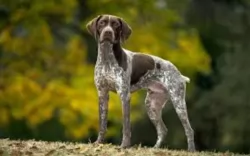 The Braques Français – Gascogne – is a hunting dog from southern France’s Gascony region. Known also as the French Gascony Pointer, this dog has descended from Spanish and Italian Pointers. The dog was saved from extinction at the turn of the 20th century.
The Braques Français – Gascogne – is a hunting dog from southern France’s Gascony region. Known also as the French Gascony Pointer, this dog has descended from Spanish and Italian Pointers. The dog was saved from extinction at the turn of the 20th century.
There are actually two breeds of Braque français, with the other being somewhat smaller and known as Braque français, type Pyrénées. Whichever one you have, they are popular hunting dogs in France. The first breed club was established in 1850.
 The Flat-Coated Retriever has a straight and strong topline with unique head, strong jaws, a long muzzle and small ears. His eyes are dark brown almonds with a friendly and intelligent expression. He has an arched neck and a moderately long tail. The Flat-Coated Retriever is more of an athlete, lighter and certainly more elegant than any other type or breed of retriever.
The Flat-Coated Retriever has a straight and strong topline with unique head, strong jaws, a long muzzle and small ears. His eyes are dark brown almonds with a friendly and intelligent expression. He has an arched neck and a moderately long tail. The Flat-Coated Retriever is more of an athlete, lighter and certainly more elegant than any other type or breed of retriever.
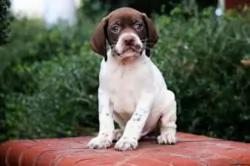 The Braque Francais is a dog which looks much like the German Short-haired Pointer. The Braque Francais (Gascogne) is a large breed dog, standing roughly 56 – 69cm. Weight is most times dependent on height, but the average weighs between 35 and 55 pounds. The dog is attractively lean and muscular and the tails have always been docked, although rules and regulations see the breed with a long tail these days. The natural tail of the Braque Francais is medium length. The eyes of this breed are brown or yellow and the ears are medium in length and floppy. The coat of the Gascogne is short and dense and in two colors – white and chestnut patching and mottling.
The Braque Francais is a dog which looks much like the German Short-haired Pointer. The Braque Francais (Gascogne) is a large breed dog, standing roughly 56 – 69cm. Weight is most times dependent on height, but the average weighs between 35 and 55 pounds. The dog is attractively lean and muscular and the tails have always been docked, although rules and regulations see the breed with a long tail these days. The natural tail of the Braque Francais is medium length. The eyes of this breed are brown or yellow and the ears are medium in length and floppy. The coat of the Gascogne is short and dense and in two colors – white and chestnut patching and mottling.
The dog is a keen tracker and is an excellent game and gun dog with some of them requiring more training than others. Training and socialization makes the Braque Francais an excellent, obedient pet who is eager to please and he is considered to be easily trainable, learning quickly. He loves his human family and is noted for his gentle, friendly nature, and he therefore makes and excellent family pet where there are children and other pets.
 The Flat-Coated Retriever is great with children. Just be careful they don’t knock over small children in their enthusiasm.
The Flat-Coated Retriever is great with children. Just be careful they don’t knock over small children in their enthusiasm.
They are confident great family dogs. They are “thinking dogs” and need something to work for or they will work for themselves. They can be clowns.
They are adaptable although their size might preclude small locations without yards.
Smart, thinking all the time, they are very trainable. However, they are considered the “Peter Pan” of dogs – they never grow up.
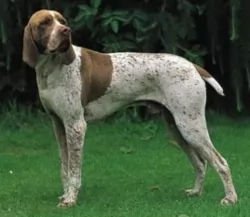 The attractive Braque Francais is a calm, contented dog who is also affectionate, social and intelligent. He is already a well mannered dog but will do even better with training and socialization. However, Braque Francais don’t take well to aggressive training and done the wrong way, the dog can end up being timid and confused.
The attractive Braque Francais is a calm, contented dog who is also affectionate, social and intelligent. He is already a well mannered dog but will do even better with training and socialization. However, Braque Francais don’t take well to aggressive training and done the wrong way, the dog can end up being timid and confused.
Wanting to please and being an intelligent dog, training should be fun, lighthearted but firm. In exchange you’re going to have an awesome friend from this wonderful, loving dog breed.
 Flat-Coated Retrievers have their share of health concerns from dysplasia to cancer. The breeds problems include:
Flat-Coated Retrievers have their share of health concerns from dysplasia to cancer. The breeds problems include:
Hemangiosarcoma, Osteosarcoma, Malignant Histiocytosis, and Fibrosarcoma. Studies show that about half of all Flat-Coated Retrievers die of cancer.
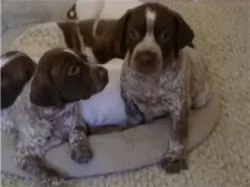 You won’t find many health issues with this active breed but nonetheless hip and joint issues will need to be watched. If you are considering a Braque Français puppy, you’ll want to be selective in choosing a responsible breeder. A healthy puppy with the right environment, can get to up to 15 years of age.
You won’t find many health issues with this active breed but nonetheless hip and joint issues will need to be watched. If you are considering a Braque Français puppy, you’ll want to be selective in choosing a responsible breeder. A healthy puppy with the right environment, can get to up to 15 years of age.
Ectropion and entropion in dogs affect their eyelids. Ectropion is where the eyelids roll outward, whereas entropion is where the eyelids curve inward, irritating the eye. Because visual and skeletal problems occur in this breed, it can be recommended that owners have their pets tested by both the Canine Eye Registration Foundation as well as the Orthopedic Foundation for Animals.
 He will be a medium size dog. Feed puppies 3-4 times a day about a 1/8 cup of high-quality food. Feed a puppy food designed for medium size dogs or specifically for retrievers.
He will be a medium size dog. Feed puppies 3-4 times a day about a 1/8 cup of high-quality food. Feed a puppy food designed for medium size dogs or specifically for retrievers.
Feed 2 times a day about !/2 cups of dry food per meal. Do not overfeed. They have a tendency to be obese.
Maintain a healthy weight and avoid exercise before and after meals. The good news is dysplasia and epilepsy are rare in the breed.
They are very energetic and need good exercise. Long walks and a yard to run in. Remember they are hunting dogs and will chase to retrieve things so don’t let them off leash outside your yard. They will excel at agility, tracking. Rally, obedience, swimming, hunting, and jogging. They make great therapy dogs.
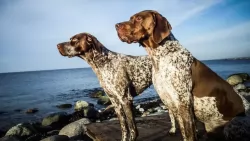 Brushing the coat twice a week will get rid of loose hairs and maintain the sheen of the coat. Also, as a floppy eared breed, attention should be given to the ears to prevent infections. He will also need to have his teeth brushed with dog toothpaste and brush to prevent the build-up of damaging plaque and his nails will also require a clipping if they don’t manage to wear down naturally.
Brushing the coat twice a week will get rid of loose hairs and maintain the sheen of the coat. Also, as a floppy eared breed, attention should be given to the ears to prevent infections. He will also need to have his teeth brushed with dog toothpaste and brush to prevent the build-up of damaging plaque and his nails will also require a clipping if they don’t manage to wear down naturally.
Daily activity will be needed for this dog and he will want a walk every day. He certainly isn’t a dog you can leave indoors or outside in your backyard day after day. Any activities that require physical exertion will be good because they are exceptional athletes. If you are a cyclist or a runner, take him with you – he’ll love it.
Your Braque Francais loves energetic activities and for this he will require an excellent nutrient-rich diet. Nutrient-rich dog foods are higher in protein and fat and lower in carbohydrates. It’s important to check out the carbohydrate content in commercial dog foods to avoid those one high in carbohydrates.
Your vet can always advise you on a good quality food and you can always give him your own home-prepared foods which include rice, vegetables and meat. Certainly include some raw meat into his diet every now and then to avoid skin problems. Fresh, cool water must be available to him night and day.